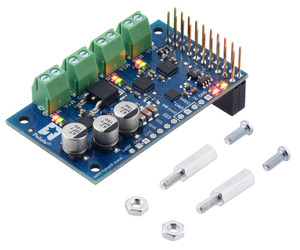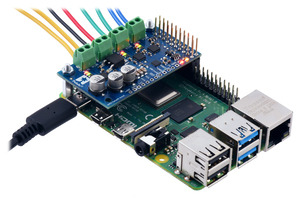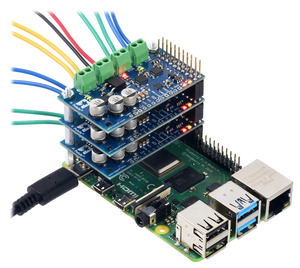Brushed DC Motor Controllers » Motoron Motor Controllers » Motoron M3H256 Triple Motor Controller for Raspberry Pi »
Motoron M3H256 Triple Motor Controller for Raspberry Pi (Connectors Soldered)
The Motoron M3H256 Triple Motor Controller makes it easy to control DC motors from a Raspberry Pi (Model B+ or newer) through an I²C interface. Each module can independently control up to three motors, and multiple Motoron boards can be stacked on top of the same Raspberry Pi for projects that need to control even more motors. The M3H256 supports motor supply voltages from 4.5 V to 48 V and can deliver continuous output currents up to 2 A per motor. This version ships with soldered stackable headers and terminal blocks.
 Compare all products in Motoron M3H256 Triple Motor Controller for Raspberry Pi.
Compare all products in Motoron M3H256 Triple Motor Controller for Raspberry Pi.
| Description | Specs (15) | Pictures (8) | Resources (5) | FAQs (0) | On the blog (2) | Distributors (26) |
|---|
Overview
The Motoron M3H256 add-on board makes it easy to control up to three bidirectional, brushed DC motors with a compatible Raspberry Pi (Model B+ or newer). It supports motor supply voltages from 4.5 V to 48 V and can deliver continuous output currents up to 2 A per motor. The M3H256 is designed to stack on top of a Raspberry Pi (Model B+ or newer), similar to a HAT (Hardware Attached on Top), and multiple Motoron controllers can be stacked on top of each other, allowing independent control of many motors. Unlike most of our motor drivers and motor driver expansion boards for Raspberry Pi, the Motoron does not require any PWM outputs on your Raspberry Pi. Instead, the Raspberry Pi communicates with the Motoron using I²C, so only two GPIO pins are needed regardless of how many Motorons you connect.
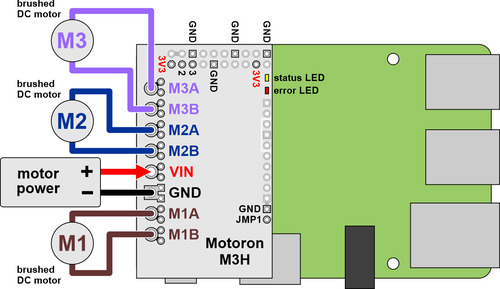 |
Three M3H256 versions are available to provide different options for the through-hole connectors:
- Motoron M3H256 with soldered stackable headers and terminal blocks
- Motoron M3H256 with headers and terminal blocks included but not soldered in
- Motoron M3H256 without any headers, terminal blocks, or mounting hardware included
For applications using an Arduino or compatible controller, consider the Motoron M3S256 instead (also available with different connector options).
Details for item #5033
This version of the Motoron M3H256 ships with soldered stackable headers and terminal blocks. It includes a set of two M2.5 standoffs (11 mm length), screws, and nuts that can be used to secure the board at the proper height for the GPIO connector.
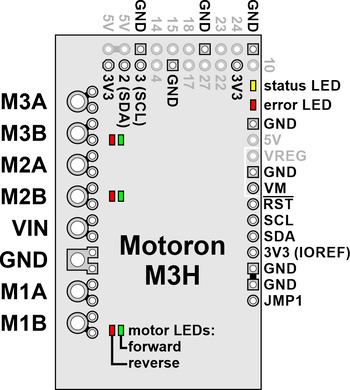 |
Motoron M3H256 or M3H550 Triple Motor Controller for Raspberry Pi pinout. |
|---|
Features and specifications
- Three motor control channels allow for independent control of up to three bidirectional brushed DC motors per Motoron
- Wide motor supply voltage range: 4.5 V to 48 V (absolute maximum)
- Recommended maximum nominal battery voltage is approximately 36 V
- Maximum output current per motor: 2.0 A continuous, 6.4 A peak for <1 second
- Reverse-voltage protection on motor power supply (down to -40 V)
- Logic voltage range: 3.0 V to 5.5 V
- Control interface: I²C
- I²C clock speed: up to 400 kHz
- Optional cyclic redundancy checking (CRC)
- Configurable motion parameters:
- Max acceleration/deceleration forward/reverse
- Starting speed forward/reverse
- Direction change delay forward/reverse
- PWM frequency: eight options available from 1 kHz to 80 kHz
- Command timeout feature stops motors if the Raspberry Pi stops communicating
- Configurable automatic error response
- Motor power supply (VIN) voltage measurement
- Optional pins make it easy to power the Raspberry Pi from reverse-protected motor power through an external regulator (not included)
- Two status LEDs
- Motor direction indicator LEDs
- Motoron Python library simplifies using the Motoron with Python or MicroPython
- Comprehensive user’s guide
The Motoron family
The tables below list the members of the Motoron family and show the key differences among them. Each type is available in several versions to provide different options for the through-hole connectors: they can be purchased as an assembled product with connectors soldered in, as a kit with connectors included but not soldered in, or (for Arduino and Raspberry Pi expansions) as a standalone board without connectors.
| Motoron motor controllers micro versions |
||||
 M1T550  M1U550 |
 M2T550  M2U550 |
 M1T256  M1U256 |
 M2T256  M2U256 |
|
|---|---|---|---|---|
| Control interface: | I²C or UART serial | |||
| Motor channels: | 1 (single) | 2 (dual) | 1 (single) | 2 (dual) |
| Minimum motor supply voltage: |
1.8 V | 4.5 V | ||
| Absolute max motor supply voltage: |
22 V | 48 V | ||
| Recommended max nominal battery voltage: |
16 V | 36 V | ||
| Max continuous current per channel: |
1.8 A | 1.6 A | 2.2 A | 1.8 A |
| Logic voltage range: | 3.0 V to 4.9 V(1) | 3.0 V to 5.5 V | ||
| Current sensing/limiting: | – | – | – | – |
| Available versions with I²C: |
||||
| Available verions with UART serial: |
||||
| Price: | $14.24 – $16.19 | $18.67 – $20.69 | $19.71 – $21.72 | $28.72 – $30.73 |
| 1 The M1x550 and M2x550 are not recommended for use with 5V nominal logic. | ||||
| Motoron motor controllers Arduino and Raspberry Pi form factor versions |
||||||
 M3S550  M3H550 |
 M3S256  M3H256 |
 M2S24v14  M2H24v14 |
 M2S24v16  M2H24v16 |
 M2S18v18  M2H18v18 |
 M2S18v20  M2H18v20 |
|
|---|---|---|---|---|---|---|
| Control interface: | I²C | |||||
| Motor channels: | 3 (triple) | 2 (dual) | ||||
| Minimum motor supply voltage: |
1.8 V | 4.5 V | 6.5 V | |||
| Absolute max motor supply voltage: |
22 V | 48 V | 40 V | 30 V | ||
| Recommended max nominal battery voltage: |
16 V | 36 V | 28 V | 18 V | ||
| Max continuous current per channel: |
1.7 A | 2 A | 14 A | 16 A | 18 A | 20 A |
| Logic voltage range: | M3S550 3.1 V to 5.5 V |
3.0 V to 5.5 V | 3.0 V to 5.5 V | |||
| M3H550 3.0 V to 4.9 V(1) |
||||||
| Current sensing/limiting: | – | – | ||||
| Available versions for Arduino: |
M3S550 | M3S256 | M2S24v14 | M2S24v16 | M2S18v18 | M2S18v20 |
| Available versions for Raspberry Pi: |
M3H550 | M3H256 | M2H24v14 | M2H24v16 | M2H18v18 | M2H18v20 |
| Price: | $25.26 – $36.14 | $42.01 – $52.94 | $71.67 – $83.56 | $96.51 – $108.41 | $71.67 – $83.56 | $109.91 – $120.39 |
| 1 The M3H550 is not recommended for use with 5V nominal logic. | ||||||

